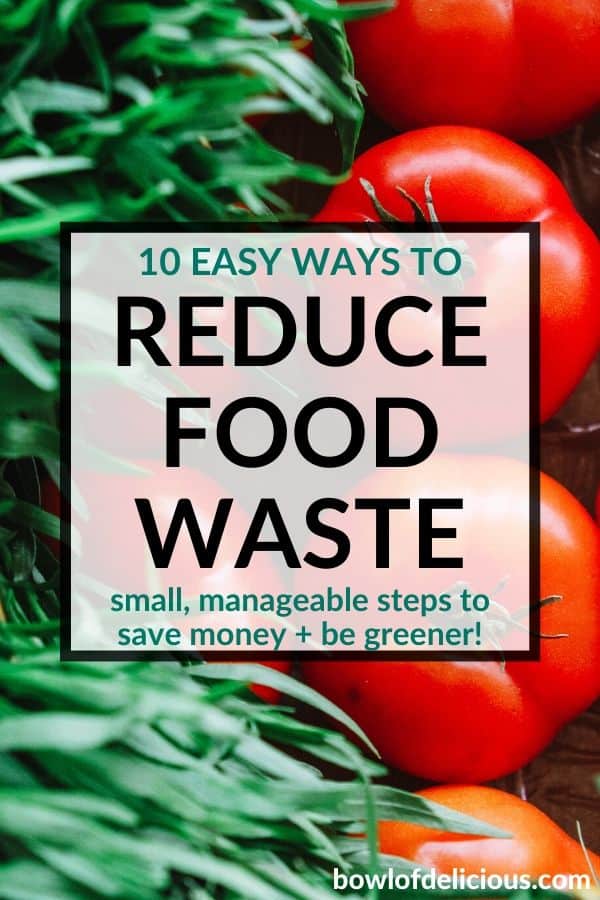On this website, some posts contain affiliate links, which means that if you buy a product using my link, I may earn a commission.
To reduce food waste in your kitchen, focus on proper meal planning and storage techniques. Food waste can be a significant issue in households, leading to both economic and environmental consequences.
However, there are several simple steps you can take to minimize waste and make the most out of your groceries. By planning your meals ahead of time, you can ensure that you only buy what you need and avoid impulse purchases that may end up going to waste.
Additionally, storing food properly, such as using airtight containers and organizing your fridge to prevent spoilage, can help extend its shelf life. Taking these measures not only saves you money but also contributes to a more sustainable lifestyle.
Understanding The Impact Of Food Waste On Sustainability
Understanding the environmental impact of food waste is crucial for sustainability. By implementing strategies to reduce food waste in your kitchen, you can contribute to a more sustainable future.
Understanding the Impact of Food Waste on SustainabilityFood waste has significant implications for sustainability efforts. By reducing food waste in our kitchens, we can make a positive impact on the environment and conserve valuable resources. Climate change, deforestation, and water scarcity are just a few of the environmental consequences associated with food waste. When we throw away edible food, we also waste the resources that went into producing, transporting, and preparing it. This includes water, energy, and land. By reducing food waste, we can decrease greenhouse gas emissions, preserve biodiversity, and protect ecosystems. Additionally, reducing food waste can also help address hunger and food insecurity by ensuring that the available food is utilized effectively. By adopting practices such as planning meals, storing food properly, and repurposing leftovers, we can all contribute to reducing food waste and promoting a more sustainable future.
The Significance of Reducing Food Waste for Sustainability Efforts
Reducing food waste is a crucial aspect of sustainability. Food waste not only affects our environment but also has social and economic implications. When food is wasted, the resources used during production are wasted as well. This includes resources like water, energy, and land. By reducing food waste, we can save these valuable resources and minimize our impact on the environment. Furthermore, reducing food waste also helps to address issues of hunger and food insecurity. By utilizing food more efficiently, we can ensure that more people have access to nutritious meals. Additionally, reducing food waste can have positive economic benefits. It can help save money for individuals, businesses, and governments by avoiding unnecessary purchasing and disposal costs. Overall, reducing food waste is a win-win situation for both the environment and society.
Identifying The Causes Of Food Waste In Your Kitchen
Reducing food waste in your kitchen starts with identifying the causes behind it. Overbuying groceries and improper meal planning are major factors contributing to food waste. Plan your meals in advance to avoid buying more than you need. Create a shopping list based on your meal plan and stick to it while at the grocery store.
Another cause of food waste is a lack of knowledge about food storage and expiration dates. Learn how to properly store different types of food to prolong their freshness. Understand expiration dates and utilize items before they go bad.
Effective leftover management and utilization can also help reduce food waste. Find creative ways to use leftovers in new meals or repurpose them. Freeze leftovers for future use or donate excess food to food banks or shelters to ensure it doesn’t go to waste.
| Causes of Food Waste in Your Kitchen |
|---|
| Overbuying groceries and improper meal planning |
| Lack of knowledge about food storage and expiration dates |
| Leftover management and utilization challenges |
Implementing Effective Meal Planning Strategies
In order to reduce food waste in your kitchen, one effective strategy is to implement meal planning. Creating weekly menus and shopping lists can help you make more intentional purchases and prevent the buying of unnecessary items that may go to waste. By planning out your meals ahead of time, you can ensure that you only buy the ingredients you need. Additionally, portion control is key in reducing waste. Cooking in appropriate quantities can help minimize leftovers that end up being thrown away. By being mindful of the amount of food you cook, you can save money, reduce waste, and create a more sustainable kitchen environment.


Credit: www.bowlofdelicious.com
Proper Food Storage Techniques To Minimize Waste
Understanding the optimal storage conditions for different food items is crucial to reducing food waste in your kitchen. Proper food storage techniques can help extend the shelf life of your groceries and minimize unnecessary waste.
When it comes to refrigeration, it is important to keep your fridge at the right temperature, ideally below 4°C (39°F). This helps slow down the growth of bacteria and other microorganisms that can cause food spoilage. Make sure to keep raw meats, poultry, and seafood separate from other food items to prevent cross-contamination.
Freezing is another effective method for extending the shelf life of certain foods. Freezing can help preserve the quality and texture of fruits, vegetables, and cooked meals. However, it is important to note that some foods, like lettuce and cucumbers, do not freeze well and may lose their crispness and texture.
When storing food in the freezer, ensure it is properly packaged to prevent freezer burn. Use resealable freezer bags or airtight containers to protect food from moisture and air exposure. Label the packages with the date to keep track of how long they have been in the freezer.
By implementing these proper storage techniques and utilizing refrigeration and freezing methods, you can significantly reduce food waste in your kitchen and help contribute to a sustainable food system.
Creative Ways To Utilize Leftovers And Scraps
Leftovers and scraps don’t have to go to waste! Repurposing leftovers into new meals and dishes is a smart and sustainable solution. Instead of throwing away that extra chicken or pasta from last night’s dinner, try incorporating them into a new recipe. For example, leftover chicken can be shredded and used in tacos or added to a salad. Similarly, pasta can be transformed into a delicious pasta salad or baked into a cheesy casserole.
Transforming vegetable and fruit scraps into compost is another effective way to reduce food waste. Collect peels, cores, and trimmings from your daily cooking and place them in a compost bin or pile. Over time, they will break down and create nutrient-rich compost that can be used in your garden.
Smart Shopping Practices To Minimize Food Waste
One of the best ways to reduce food waste in your kitchen is to adopt smart shopping practices. Here are a few tips to help you minimize waste:
- Purchasing only what is needed: Before heading to the grocery store, make a list of the items you truly need. Stick to the list and avoid buying unnecessary items on impulse.
- Buying local and seasonal produce: Local and seasonal fruits and vegetables have a shorter transportation period, reducing the chances of spoilage. Plus, supporting local farmers contributes to sustainable farming practices.
By following these simple practices, you can reduce food waste and make a positive impact on the environment.
Enhancing Awareness And Education In The Kitchen
One effective way to reduce food waste in your kitchen is by enhancing awareness and education among your family members. Educating them about the importance of reducing food waste can help promote mindful consumption habits.
Start by discussing the environmental and economic impacts of food waste. Highlight how it contributes to greenhouse gas emissions and strains resources. Emphasize the importance of planning meals, proper storage, and utilizing leftovers.
Another approach is to share tips and resources on food waste reduction within your community. Exchange ideas with neighbors, join online forums or social media groups, and participate in local events focused on sustainable eating and minimizing waste.
Remember, small changes can make a significant difference. Together, we can create a more sustainable future by reducing food waste in our kitchens.
Supporting Food Rescue Organizations And Initiatives
In order to reduce food waste in your kitchen, one effective way is to support food rescue organizations and initiatives. One way to do this is by donating excess food to local food banks or shelters. Rather than letting food go to waste, you can ensure that it is given to those in need. Additionally, participating in community-based initiatives aimed at combating food waste can also make a difference. By getting involved in such initiatives, you can help raise awareness about the issue of food waste and work towards finding sustainable solutions. Supporting food rescue organizations and initiatives is an impactful way to contribute to reducing food waste in our communities.
Composting: A Green Solution To Kitchen Waste
Composting is a simple and effective way to reduce food waste and contribute to a greener environment. Setting up a composting system in your kitchen allows you to transform organic waste into nutrient-rich soil that can be used in your garden or for potted plants.
Start by designating a specific area in your kitchen for composting. This can be a bin, a container, or even a composting machine. Make sure it has a lid to prevent any smells or pests.
Collect all your organic waste, such as fruit and vegetable scraps, coffee grounds, and eggshells. Avoid adding meat, dairy, or oily food waste as they can attract pests.
Layer the organic waste with dry materials like leaves, shredded paper, or cardboard to create a balance of carbon and nitrogen. This helps to speed up the composting process.
Regularly turn the compost to ensure proper aeration and decomposition. This allows the organic material to break down faster and become nutrient-rich soil.
Once the compost is ready, use it as a natural fertilizer for your garden or potted plants. It enriches the soil, improves its structure, and promotes healthy plant growth.
Composting is a sustainable and eco-friendly solution to reduce food waste and give back to the environment. By implementing a composting system in your kitchen, you can make a positive impact while enjoying the benefits of nutrient-rich soil.
Utilizing Sustainable Storage And Packaging Solutions
Reduce food waste in your kitchen with sustainable storage and packaging solutions. By using eco-friendly containers and proper organization, you can extend the shelf life of your ingredients and contribute to a greener lifestyle.
Using sustainable storage and packaging solutions is an important step towards reducing food waste in the kitchen. Instead of relying on single-use plastics, opting for reusable containers and wraps can make a significant difference. Consider investing in eco-friendly storage options such as glass jars or beeswax wraps. These alternatives not only help in keeping your food fresh but also contribute to environmental conservation. Reusable containers allow for easy organization and stackability, minimizing the chances of food getting forgotten or spoiled. Beeswax wraps, on the other hand, are a great option for storing fruits, vegetables, and baked goods. By choosing these sustainable storage and packaging solutions, you can not only minimize food waste but also promote a more eco-friendly lifestyle in your kitchen.Regularly Monitoring And Adjusting Food Purchasing Habits
Regularly monitoring and adjusting your food purchasing habits is one effective way to reduce food waste in your kitchen. By keeping track of your food consumption patterns, you can identify areas where you may be buying too much or not using certain ingredients in a timely manner. This awareness allows you to make adjustments to your shopping habits based on your specific needs and preferences.
Frequently Asked Questions On How To Reduce Food Waste In Your Kitchen
How Can I Reduce Food Waste In My Kitchen?
You can reduce food waste in your kitchen by planning meals in advance, properly storing perishable items, using leftovers creatively, composting food scraps, and donating excess food to local charities.
Why Is Reducing Food Waste Important?
Reducing food waste is important because it helps decrease environmental impact, conserves resources, saves money, and reduces the amount of food that ends up in landfills, which contributes to greenhouse gas emissions.
What Are Some Tips For Preventing Food Waste?
To prevent food waste, you can shop with a list, buy only what you need, check your pantry and fridge before shopping, store food properly, use a first-in-first-out approach for perishables, and learn creative ways to use up ingredients.
How Does Proper Storage Prevent Food Waste?
Proper storage prevents food waste by keeping perishable items fresh for longer. This includes using airtight containers, storing food in the right temperature and humidity conditions, and following storage guidelines for different types of produce, meat, and dairy products.
Conclusion
Minimizing food waste is crucial in maintaining sustainability in our kitchens. By implementing simple practices like meal planning, proper storing techniques, and utilizing leftovers creatively, we can significantly reduce the amount of food that goes to waste. Moreover, being mindful of expiration dates and buying only what we need can go a long way in reducing food waste.
Let’s make a conscious effort to embrace these practices and contribute to a more sustainable future.
On this website, some posts contain affiliate links, which means that if you buy a product using my link, I may earn a commission.

